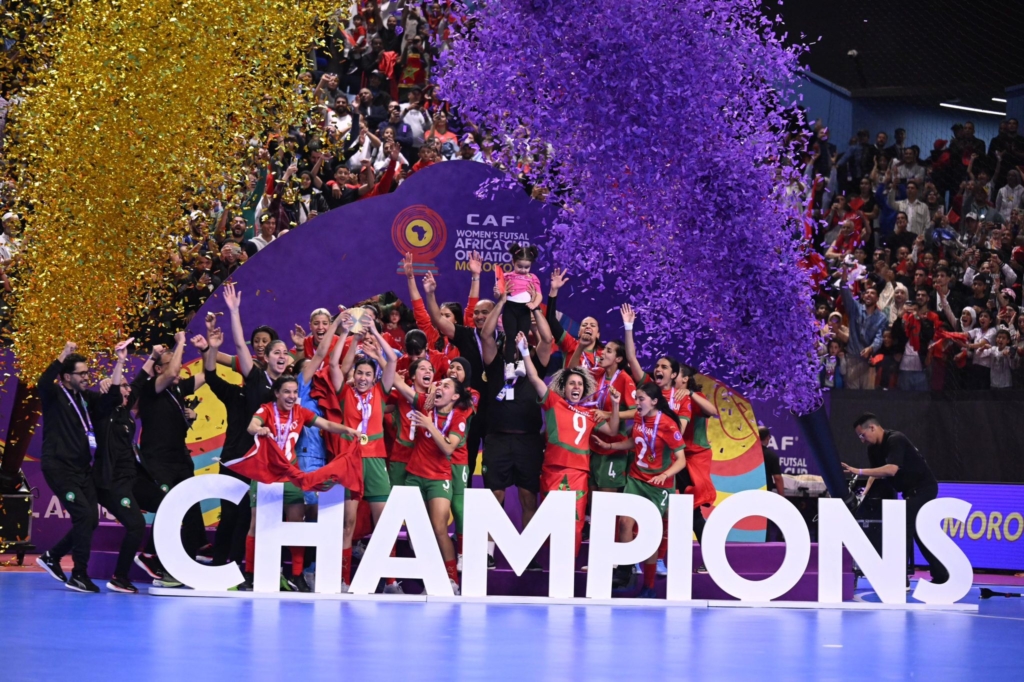African Women’s Futsal: Morocco and Tanzania make continental history, awaiting global stage – Nsemkeka
The inaugural CAF Women’s Futsal Africa Cup of Nations concluded in
Rabat, Morocco, on April 30, 2025. The nine-day tournament not only
crowned its maiden champions but also determined the two teams that will
represent the continent at the inaugural FIFA Women’s Futsal World Cup in
the Philippines later this year.
Morocco, the hosts, asserted their dominance throughout the competition.
After emerging top of Group A with two wins from as many games —
following an 8-1 demolition of Namibia and a 7–1 rout of Cameroon — the
North Africans dispatched semi-final opponents Angola by another
comfortable scoreline, before edging plucky Tanzania by a solitary goal in
the final (3-2).
The triumphant Moroccan side was bolstered by the contribution of former
footballer Doha El Madani (previously of AS FAR), who bagged a chart-
topping five goals. Another whose previous experience in professional
football neatly translated to the smaller, faster format at the tournament is
Meryem Hajri.
The veteran ex-Morocco international, who helped SC Casablanca to a
CAF Women’s Champions League final two years ago, discovered futsal in
an off-season training camp and fell in love immediately, eventually
developing that casual interest into something concrete golden.
Tanzania’s Spectacular Run
Silver, in the end, was Tanzania’s lot, but that is hardly anything to be
embarrassed about, as the team’s journey to the final was nothing short of
monumental.
As the first nation from CECAFA (the sub-regional football organisation for
East and Central African countries) to set up a women’s futsal team,
Tanzania’s involvement in this tournament marked a significant milestone.
Their performances were impressive every step of the way, the pick of
which was a stunning 5-2 defeat of Cameroon — who ultimately finished
third, beating Angola — in the semi-finals, a result which booked their slot
alongside Morocco at the upcoming World Cup.
“We didn’t know what to expect,” Zubeda Mgunda, the Tanzania head
coach, admitted afterwards.
“Some of our players had never played futsal before January. But they
believed in each other, and now they’ve made history.”
Other Honours
The competition’s individual laurels, rather unsurprisingly, went to players
of the top two sides: Morocco’s Jasmine Demraoui and El Madani picked
up the Best Player and Top Scorer prizes, respectively, while Nassra
Abbas of Tanzania was adjudged Best Goalkeeper.
The Fair Play Award went to Namibia, as scant consolation for a
chastening first-round exit.
A Springboard for Women’s Futsal
The tournament did feel like a celebration of the acceleration that women’s
futsal across Africa has enjoyed since its inception just about six months
ago.
In that period, national teams have been built entirely off the ground,
bringing exposure to the sport and encouraging significant investment in
same.
Still, the competition’s success felt less like a culmination of all that has
been achieved already and more an indicator of the potential that could yet
be harnessed — an inspiration for further development of women’s futsal
and a boost to the overall growth of women’s sports in Africa.
Looking Ahead
The spotlight now shifts to the global stage, where Morocco and Tanzania
will aim to make an impression and represent with distinction not just
themselves, but indeed the whole of Africa.
Beyond that expected exhibition of the merits of women’s futsal in Africa,
though, the overall task of kicking on from the just-ended tournament
belongs to CAF — and it is one they intend to discharge very diligently.
“This was long overdue,” Meskerem Tadesse, CAF’s Women’s Football
Director, remarked after the event.
“We saw talent, we saw passion, and we saw possibility. Now it’s our
responsibility to build structures that can sustain and elevate this game.”

